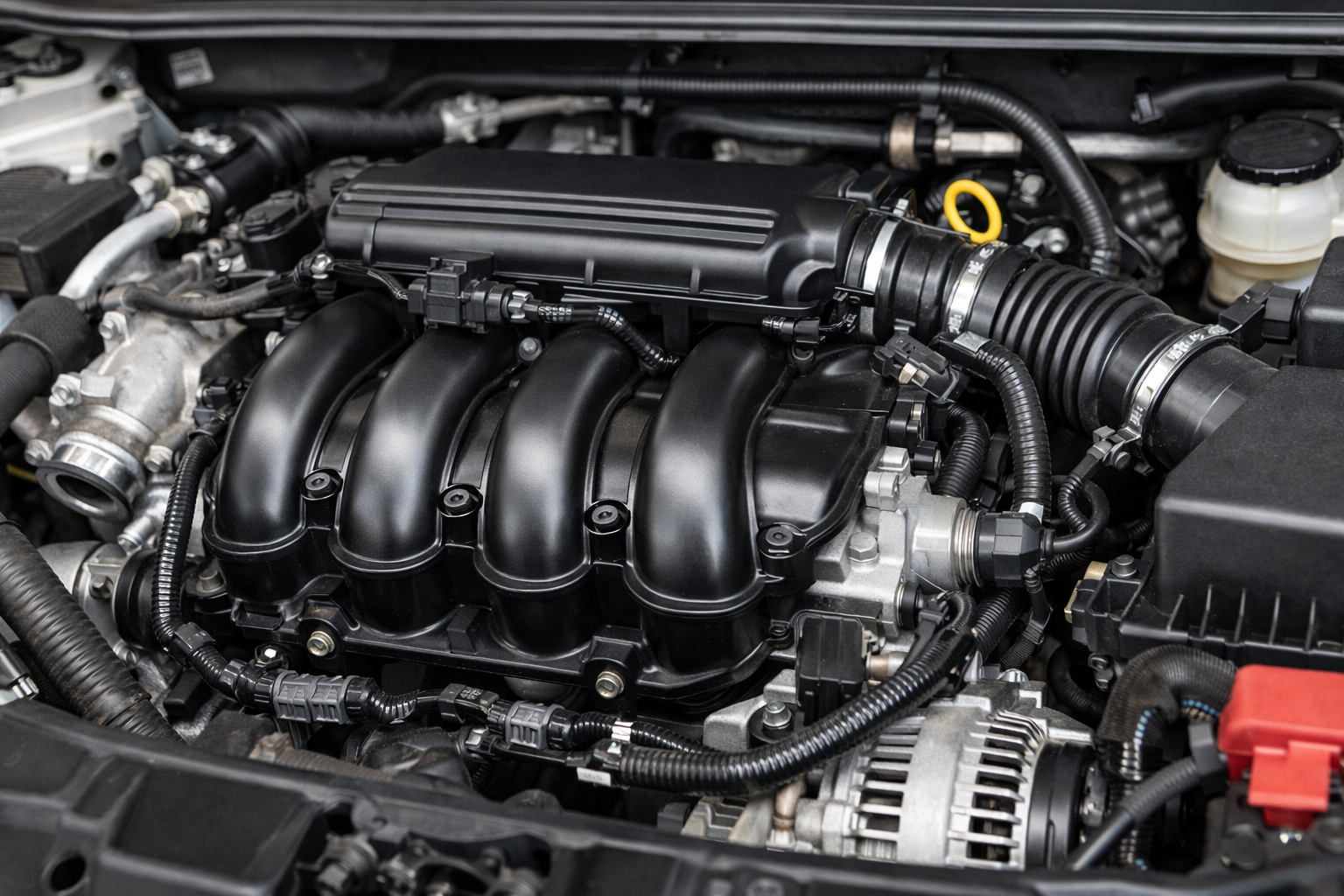Blog
From the Shop
Insights, tips & updates from our team
Helpful automotive information from technicians you can trust
Our blog shares practical advice, service insights, and shop updates to help you better understand your vehicle and make informed decisions. From maintenance tips and warning signs to seasonal reminders and industry updates, our goal is to provide clear, useful information backed by real experience.

By Michael Lazo
•
January 1, 2026
This time of year, many vehicle owners notice subtle power loss or sluggishness and dismiss it as “just winter sluggishness.” However, these signs—rough idling, hesitant acceleration, or a drop in fuel economy—are often the quiet warnings of Intake Manifold Carbon Build-Up. In this month’s blog, we examine how carbon deposits can wreak havoc on your vehicle’s intake manifold ... Read more
The post Intake Manifold Carbon Build-Up first appeared on Shade Tree Garage | Morristown, NJ.

By Shade Tree Garage
•
November 25, 2024
How familiar are you with the common engine problems that you may experience with your vehicle? If you are on the road often, it is important to have a baseline understanding of problems that may impact your vehicle’s engine and your overall driving performance. In this month’s blog post, we review some of the more common problems you may experience with your engine. All these issues should be addressed promptly by a service professional to avoid complications to your engine or its components.

By Shade Tree Garage
•
April 25, 2024
If you are driving a newer automatic transmission vehicle, it is likely that it is equipped with a continuous variable transmission (CVT). More automatics made within the last fifteen years have adapted to CVT to improve overall driving performance. Unlike traditional automatic transmissions that use a set number of gears, a CVT adjusts the gear ratio in a fluid, uninterrupted manner. This modern enhancement in vehicle design provides a more efficient and smoother transmission. In this month’s blog post, we examine the workings of a CVT, discuss some common issues it might face, and provide tips on how to maintain it.

By Shade Tree Garage
•
April 1, 2024
Winter weather has arrived across the nation, and it’s proving to be a challenge for many drivers. The hazards of winter driving are just one aspect of winter weather that can wreak damage on your vehicle. The cold extremes of winter can have a significant impact on your engine’s performance and operation. In this month’s blog post, we examine the drawbacks of winter weather woes on your vehicle and steps you can take to keep your vehicle protected from damage during the winter season.

By Shade Tree Garage
•
March 31, 2024
Oil is the lifeblood of your vehicle. It lubricates the engine’s moving parts, reduces friction, prevents overheating, and helps maintain the overall health of your vehicle. However, oil leaks can lead to serious engine damage if not addressed promptly. In this month’s blog post, we examine the top six signs that your vehicle may have an oil leak.

By Shade Tree Garage
•
December 15, 2023
The computerized vehicle diagnostic system, often referred to as an On-Board Diagnostics (OBD) system, is a sophisticated piece of technology that plays a crucial role in maintaining the health of your vehicle. In this month’s blog, we discuss how the OBD may not always pinpoint the source of your vehicle’s problem without further exploration by a trained service professional.

By Shade Tree Garage
•
December 1, 2023
Just as engine oil is essential for the smooth operation of your vehicle’s engine, transmission fluid plays a crucial role in the functioning of your vehicle’s transmission. When the level of transmission fluid drops for various reasons, it can compromise your transmission. A compromised transmission can lead to a complete transmission failure, which can be an expensive problem for vehicle owners. In this blog post, we delve into the common signs of low transmission fluid to help you prevent a total breakdown of your vehicle’s transmission.

By Shade Tree Garage
•
November 1, 2023
If you own a vehicle, you probably know that regular maintenance is essential to keep it running smoothly and safely. But sometimes, life gets in the way, and you may be tempted to ignore some minor problems or postpone some routine services. However, this can be a costly mistake that can lead to bigger issues down the road. In this month’s blog post, we highlight the top 10 ignored issues in your vehicle and what can go wrong if you neglect them.

By Michael Lazo
•
January 1, 2026
This time of year, many vehicle owners notice subtle power loss or sluggishness and dismiss it as “just winter sluggishness.” However, these signs—rough idling, hesitant acceleration, or a drop in fuel economy—are often the quiet warnings of Intake Manifold Carbon Build-Up. In this month’s blog, we examine how carbon deposits can wreak havoc on your vehicle’s intake manifold ... Read more
The post Intake Manifold Carbon Build-Up first appeared on Shade Tree Garage | Morristown, NJ.

By Shade Tree Garage
•
November 25, 2024
How familiar are you with the common engine problems that you may experience with your vehicle? If you are on the road often, it is important to have a baseline understanding of problems that may impact your vehicle’s engine and your overall driving performance. In this month’s blog post, we review some of the more common problems you may experience with your engine. All these issues should be addressed promptly by a service professional to avoid complications to your engine or its components.

By Shade Tree Garage
•
April 25, 2024
If you are driving a newer automatic transmission vehicle, it is likely that it is equipped with a continuous variable transmission (CVT). More automatics made within the last fifteen years have adapted to CVT to improve overall driving performance. Unlike traditional automatic transmissions that use a set number of gears, a CVT adjusts the gear ratio in a fluid, uninterrupted manner. This modern enhancement in vehicle design provides a more efficient and smoother transmission. In this month’s blog post, we examine the workings of a CVT, discuss some common issues it might face, and provide tips on how to maintain it.

By Shade Tree Garage
•
April 1, 2024
Winter weather has arrived across the nation, and it’s proving to be a challenge for many drivers. The hazards of winter driving are just one aspect of winter weather that can wreak damage on your vehicle. The cold extremes of winter can have a significant impact on your engine’s performance and operation. In this month’s blog post, we examine the drawbacks of winter weather woes on your vehicle and steps you can take to keep your vehicle protected from damage during the winter season.

By Shade Tree Garage
•
March 31, 2024
Oil is the lifeblood of your vehicle. It lubricates the engine’s moving parts, reduces friction, prevents overheating, and helps maintain the overall health of your vehicle. However, oil leaks can lead to serious engine damage if not addressed promptly. In this month’s blog post, we examine the top six signs that your vehicle may have an oil leak.

By Shade Tree Garage
•
December 15, 2023
The computerized vehicle diagnostic system, often referred to as an On-Board Diagnostics (OBD) system, is a sophisticated piece of technology that plays a crucial role in maintaining the health of your vehicle. In this month’s blog, we discuss how the OBD may not always pinpoint the source of your vehicle’s problem without further exploration by a trained service professional.

By Shade Tree Garage
•
December 1, 2023
Just as engine oil is essential for the smooth operation of your vehicle’s engine, transmission fluid plays a crucial role in the functioning of your vehicle’s transmission. When the level of transmission fluid drops for various reasons, it can compromise your transmission. A compromised transmission can lead to a complete transmission failure, which can be an expensive problem for vehicle owners. In this blog post, we delve into the common signs of low transmission fluid to help you prevent a total breakdown of your vehicle’s transmission.

By Shade Tree Garage
•
November 1, 2023
If you own a vehicle, you probably know that regular maintenance is essential to keep it running smoothly and safely. But sometimes, life gets in the way, and you may be tempted to ignore some minor problems or postpone some routine services. However, this can be a costly mistake that can lead to bigger issues down the road. In this month’s blog post, we highlight the top 10 ignored issues in your vehicle and what can go wrong if you neglect them.



